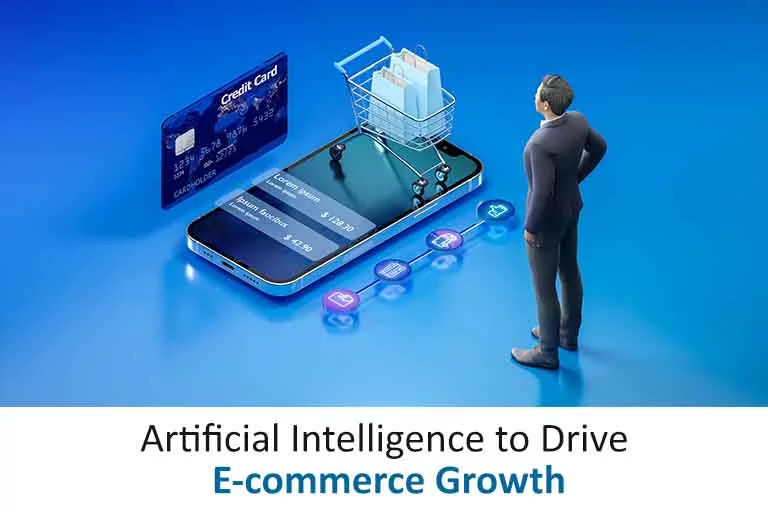The use of artificial intelligence to drive e-commerce is growing in importance. Artificial intelligence (AI) may assist retailers in personalizing the shopping experience, optimizing pricing tactics, and automating various business procedures. AI-powered Chatbot and virtual assistants can improve customer service and give clients 24-hour help.
Meaning of artificial intelligence to drive e-commerce
Artificial intelligence allows an e-commerce website to propose items specifically tailored to customers and allows users to search for products using conversational language or visuals as if they were engaging with a person. Customers base their purchase decisions on product descriptions. E-commerce may use AI content-generating technologies to utilize the power of AI to develop descriptions that address the buyer’s interest. AI plays a significant role in improving consumer experiences and developing creative solutions in the eCommerce business.
Some of the most notable applications of artificial intelligence to drive e-commerce are:
- product suggestions
- personalized shopping experiences
- virtual assistants
- Chatbot, and
- voice search
Artificial intelligence to drive e-commerce
- Data Mining
Data mining software is used by businesses to understand more about their clients. It can assist them in developing more successful marketing strategies, increasing sales, and lowering expenses. It is a type of data analysis and business intelligence. It is the process of analyzing data to derive meaningful findings or forecasts. It is a marketing and product development approach commonly used by large-scale E-commerce enterprises.
In artificial intelligence, data mining, additionally referred to as knowledge discovery in databases, is the nontrivial extract of hidden, hitherto unknown, and possibly valuable information from data. Statistical approaches are used to identify patterns and other linkages in massive databases. Data mining has improved organizational decision-making through clever data analytics.
The data mining techniques that enable these studies serve two purposes:
- they may describe the target dataset
- forecast outcomes using machine learning algorithms
- Machine Learning
By optimizing on-site search engines and providing intelligent product suggestions on ecommerce websites, machine learning may enhance conversion rates. Using artificial intelligence to provide “smarter” outcomes that align with the customer’s actions and thoughts. In e-commerce, machine learning is used to detect and prevent fraud. Machine learning algorithms can analyze client behavior and detect odd activities that may indicate fraudulent action. This technology has already helped to minimize e-commerce fraud and is likely to do so in the future.
Machine learning predictions in e-commerce reduce corporate and consumer costs while enhancing customer satisfaction. Demand forecasting for certain product categories will assist in fulfilling all future client desires and trends.
Why Artificial intelligence is the future of e-commerce?
Developing a deeper knowledge of your clients will always be a big benefit as an e-commerce site. You can use your consumer data more with the help of artificial intelligence and machine learning. AI will significantly influence the e-commerce sector, with evidence indicating that e-commerce is one of the top areas suitable for AI investment. Thanks to AI, customers will have a simpler, more seamless, more convenient, personalized, and speedier buying experience than ever before.
AI enables an e-commerce website to propose items specifically tailored to customers and lets users search for things using conversational language or imagery as if engaging with someone. It is rightly said: artificial intelligence to drive e-commerce.
Benefits of using Artificial intelligence in the e-commerce industry
- E-commerce Automation
Today’s internet stores must be accessible 24 hours a day, seven days a week, through many channels. Automating customer assistance may save time, energy, and operational capital for eCommerce organizations. Fortunately, AI has again demonstrated that it might greatly aid online enterprises. Regarding automation, artificial intelligence (AI) plays a critical role in assisting eCommerce business owners. Automation takes over and automates these repetitive operations, simplifying front- and back-end workflows.
- Intelligent search
On an eCommerce website, many buyers utilize the search box to discover goods. These clients are more likely to buy than those who are merely “window shopping.” The most difficult challenge here is locating what object is needed. Many people need help finding what they seek, even after using relevant keywords. Smart search is also known as “searchandizing.” It’s a mix of commerce and searching. It combines merchandising approaches with web search methods.
- Strong Search Experiences
Customers exit e-commerce sites for a variety of reasons, one of which is a lack of available items. An online business often includes a long list of items, making it difficult for the consumer to discover what he requires. As a result, it is critical to write a strong and precise research report. Artificial intelligence is a technology that can assist in fulfilling a requirement.
- Improved Customer Service
Customers entering a typical brick-and-mortar company model are met by a sales associate who may answer their queries and direct them to goods they might be interested in. AI chatbots and sales personnel are bridging the gap between offline and online purchasing experiences. They may answer in-the-moment queries regarding items, shipping, and orders and direct customers to the material and information they require to make purchase decisions.
- Integration of Customer Relationship Management
Integrating artificial intelligence with your CRM tool can help it become smarter and more responsive to the demands of your customers. It’s a lot of victories. AI can also help dynamically update contacts in real-time, avoid duplications, and organize documents better in a centralized format with smart categorizations. With this, you can forecast sales more accurately by analyzing trends and past sales and tracking the conversion of leads into potential customers.

